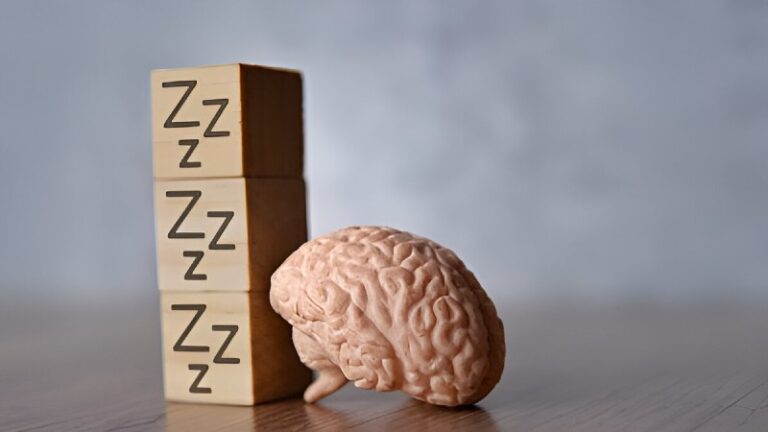Sleep is often described as a daily reset button, but modern neuroscience shows it’s far more than just rest. While many articles focus on sleep stages or circadian rhythms, fewer explore how sleep acts as the brain’s operating system update a nightly process that not only consolidates memories but also fine-tunes brain circuits, flushes waste, and recalibrates emotional balance.
Why the Brain Needs Sleep
Sleep is not passive downtime. Instead, it’s an active process that engages almost every system of the body especially the brain. From the moment we fall asleep, brain activity doesn’t shut off; it reorganizes itself into specific patterns that prepare us for the challenges of the next day.
- Memory consolidation: Non-REM sleep strengthens factual learning, while REM sleep supports creativity and problem-solving.
- Neural detoxification: The glymphatic system clears out beta-amyloid and other toxic proteins linked to Alzheimer’s.
- Emotional recalibration: Dreaming appears to help the amygdala regulate fear and anxiety responses.
The Sleep Cycle
Sleep is structured into cycles lasting about 90 minutes, each alternating between non-REM and REM sleep. Think of it as a neural symphony—each stage playing a unique role in brain health.
| Stage | Key Brain Functions |
|---|---|
| Non-REM Stage 1 | Transition from wakefulness; light sleep, reduced brainwave activity |
| Non-REM Stage 2 | Sleep spindles and K-complexes strengthen memory traces |
| Non-REM Stage 3 (Deep Sleep) | Slow-wave sleep critical for brain restoration and toxin clearance |
| REM Sleep | Heightened brain activity, vivid dreaming, emotional processing |
Over the night, we spend less time in deep non-REM sleep and more in REM sleep. This shift may explain why a late-night dream feels more vivid than those early in the night.
How Sleep Regulates Brain Chemistry
The brain orchestrates sleep through a complex interplay of neurotransmitters and hormones. The sleep drive builds through the day as adenosine accumulates in the brain—an effect we counteract (temporarily) with caffeine. Meanwhile, circadian rhythms regulate the timing of sleep by adjusting melatonin production based on light exposure.
- Adenosine: Builds up during wakefulness, creating sleep pressure.
- Melatonin: Signals the onset of night, influenced by light exposure.
- Cortisol: Peaks in the morning to promote alertness.
- Growth hormone: Released during deep sleep, repairing neural and body tissues.
Sleep as Brain Circuitry Maintenance
One emerging perspective is that sleep acts like a nightly neural maintenance program. Instead of simply storing memories, the brain actively prunes unnecessary connections while strengthening essential ones. This process, called synaptic homeostasis, ensures our brains don’t become overloaded with irrelevant information.
Imagine your brain as a smartphone: without regular software updates and cache clearing, it slows down, overheats, and crashes. Sleep is that update—clearing old data, optimizing processing power, and improving energy efficiency for the next day.
The Brain on Too Little Sleep
When we cut sleep short, the effects ripple through the brain in surprising ways. Lack of sleep does not only make us tired—it alters how the brain functions at its core.
- Impaired learning: Without sufficient deep sleep, the hippocampus struggles to transfer new memories into long-term storage.
- Emotional volatility: Sleep loss increases reactivity in the amygdala, making us more prone to stress and negative emotions.
- Slowed clearance of toxins: Beta-amyloid builds up, raising risk of cognitive decline.
- Metabolic disruption: Hormonal imbalances affect appetite, linking poor sleep to obesity and diabetes.
Sleep and Neurological Disease
Increasing evidence shows disrupted sleep may not just be a symptom of brain diseases like Alzheimer’s or Parkinson’s—it may actually be an early warning sign. For instance, people with REM Sleep Behavior Disorder (RBD), where dreams are physically acted out, often develop Parkinson’s years later.
Meanwhile, reduced slow-wave sleep is associated with greater accumulation of beta-amyloid in the brain, a hallmark of Alzheimer’s disease. This suggests sleep is not only restorative but potentially disease-modifying.
Practical Ways to Optimize Sleep for Brain Health
Improving sleep is not only about quantity but also quality and timing. Here are research-backed strategies to optimize sleep for brain performance:
- Honor your circadian rhythm: Go to bed and wake up at consistent times, even on weekends.
- Control light exposure: Seek sunlight in the morning, avoid blue light from screens at night.
- Mind caffeine and alcohol: Both disrupt deep sleep stages and can cause early awakenings.
- Create a sleep-friendly environment: Cool, dark, and quiet bedrooms enhance melatonin release.
- Engage in daily exercise: Physical activity promotes deeper non-REM sleep.
- Consider naps wisely: Short power naps (10–20 minutes) can recharge the brain but don’t replace full sleep cycles.
Sleep and Brain Health
| Statistic | Source |
|---|---|
| 50–70 million U.S. adults have a sleep disorder | American Sleep Association |
| Sleep deprivation costs the U.S. economy up to $411 billion annually | RAND Corporation |
| Adults need 7–9 hours of sleep per night | National Sleep Foundation |
| 1 in 3 adults do not get enough sleep regularly | CDC |
Conclusion
Far from being wasted time, sleep is one of the brain’s most sophisticated processes—an elegant orchestration of chemical, electrical, and structural changes that keep us sharp, healthy, and emotionally balanced. By viewing sleep as a nightly system update rather than a passive state, we unlock a deeper appreciation of its role in preventing disease and enhancing human potential. If you want a healthier brain, the science is clear: protect your sleep, and your sleep will protect you.
Frequently Asked Questions (FAQs)
How many hours of sleep do adults need for optimal brain health?
Most adults require 7–9 hours of quality sleep per night. Sleep less than this regularly can impair memory, cognitive function, and emotional regulation.
What happens in the brain during deep sleep?
During deep (slow-wave) sleep, the brain clears toxic waste via the glymphatic system, strengthens essential neural connections, and consolidates memories learned during the day.
Can lack of sleep increase the risk of neurological diseases?
Yes. Chronic sleep deprivation or disrupted sleep is linked to higher risks of Alzheimer’s, Parkinson’s, dementia, and cognitive decline.
How does REM sleep benefit the brain?
REM sleep supports emotional regulation, problem-solving, and creativity. It also helps the brain process complex information and integrate new learning into long-term memory.
What lifestyle changes improve sleep quality?
- Maintain a consistent sleep-wake schedule.
- Get morning sunlight and avoid blue light at night.
- Limit caffeine and alcohol before bed.
- Exercise regularly, but not right before sleep.
- Create a cool, dark, and quiet sleep environment.


